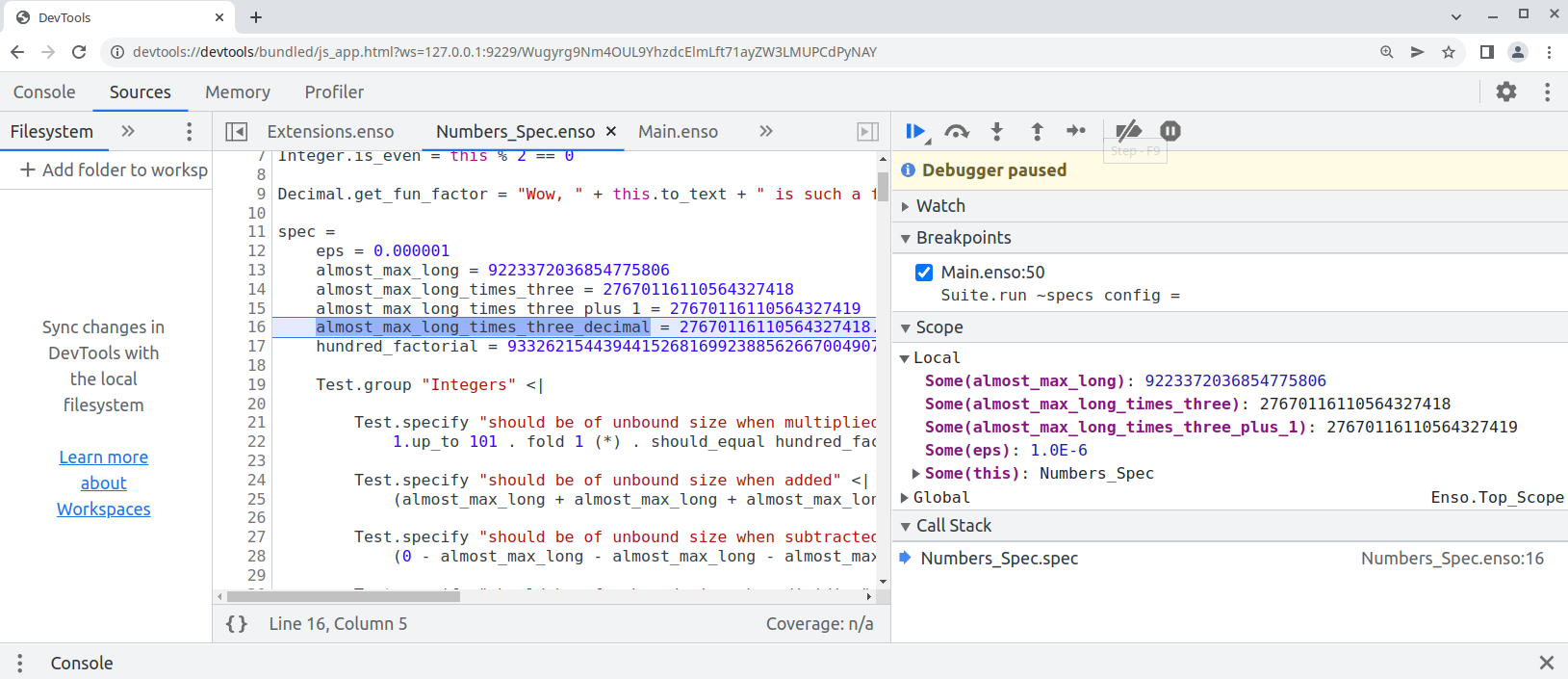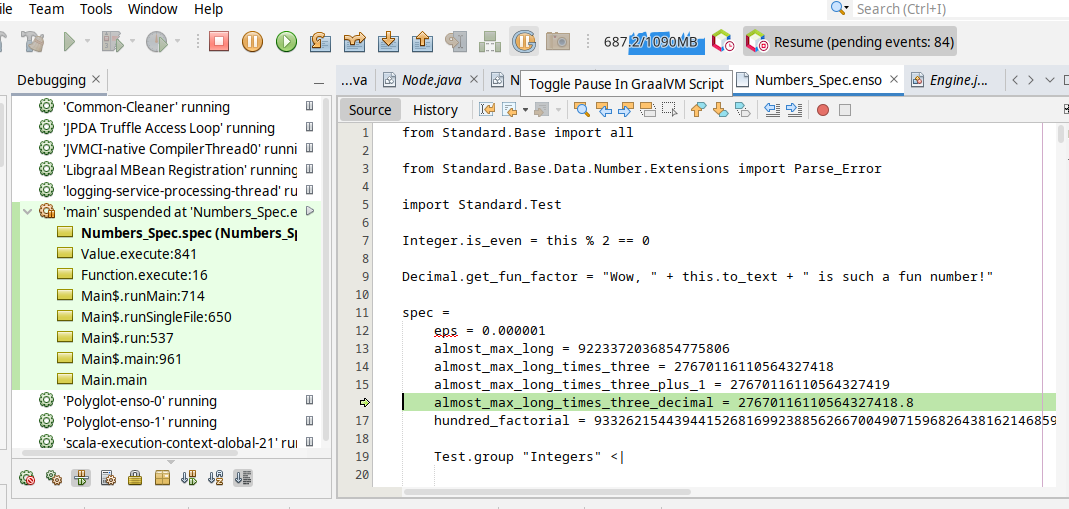Promoted `with`, `take`, `finalize` to be methods of Managed_Resource
rather than static methods always taking `resource`, for consistency
reasons.
This required function dispatch boilerplate, similarly to `Ref`.
In future iterations we will address this boilerplate code.
Related to https://www.pivotaltracker.com/story/show/182212217
Finally this pull request proposes `--inspect` option to allow [debugging of `.enso`](e948f2535f/docs/debugger/README.md) in Chrome Developer Tools:
```bash
enso$ ./built-distribution/enso-engine-0.0.0-dev-linux-amd64/enso-0.0.0-dev/bin/enso --inspect --run ./test/Tests/src/Data/Numbers_Spec.enso
Debugger listening on ws://127.0.0.1:9229/Wugyrg9Nm4OUL9YhzdcElmLft71ayZW3LMUPCdPyNAY
For help, see: https://www.graalvm.org/tools/chrome-debugger
E.g. in Chrome open: devtools://devtools/bundled/js_app.html?ws=127.0.0.1:9229/Wugyrg9Nm4OUL9YhzdcElmLft71ayZW3LMUPCdPyNAY
```
copy the printed URL into chrome browser and you should see:

One can also debug the `.enso` files in NetBeans or [VS Code with Apache Language Server extension](https://cwiki.apache.org/confluence/display/NETBEANS/Apache+NetBeans+Extension+for+Visual+Studio+Code) just pass in special JVM arguments:
```bash
enso$ JAVA_OPTS=-agentlib:jdwp=transport=dt_socket,server=y,address=8000 ./built-distribution/enso-engine-0.0.0-dev-linux-amd64/enso-0.0.0-dev/bin/enso --run ./test/Tests/src/Data/Numbers_Spec.enso
Listening for transport dt_socket at address: 8000
```
and then _Debug/Attach Debugger_. Once connected choose the _Toggle Pause in GraalVM Script_ button in the toolbar (the "G" button):

and your execution shall stop on the next `.enso` line of code. This mode allows to debug both - the Enso code as well as Java code.
Originally started as an attempt to write test in Java:
* test written in Java
* support for JUnit in `build.sbt`
* compile Java with `-g` - so it can be debugged
* Implementation of `StatementNode` - only gets created when `materialize` request gets to `BlockNode`
This PR replaces hard-coded `@Builtin_Method` and `@Builtin_Type` nodes in Builtins with an automated solution
that a) collects metadata from such annotations b) generates `BuiltinTypes` c) registers builtin methods with corresponding
constructors.
The main differences are:
1) The owner of the builtin method does not necessarily have to be a builtin type
2) You can now mix regular methods and builtin ones in stdlib
3) No need to keep track of builtin methods and types in various places and register them by hand (a source of many typos or omissions as it found during the process of this PR)
Related to #181497846
Benchmarks also execute within the margin of error.
### Important Notes
The PR got a bit large over time as I was moving various builtin types and finding various corner cases.
Most of the changes however are rather simple c&p from Builtins.enso to the corresponding stdlib module.
Here is the list of the most crucial updates:
- `engine/runtime/src/main/java/org/enso/interpreter/runtime/builtin/Builtins.java` - the core of the changes. We no longer register individual builtin constructors and their methods by hand. Instead, the information about those is read from 2 metadata files generated by annotation processors. When the builtin method is encountered in stdlib, we do not ignore the method. Instead we lookup it up in the list of registered functions (see `getBuiltinFunction` and `IrToTruffle`)
- `engine/runtime/src/main/java/org/enso/interpreter/runtime/callable/atom/AtomConstructor.java` has now information whether it corresponds to the builtin type or not.
- `engine/runtime/src/main/scala/org/enso/compiler/codegen/RuntimeStubsGenerator.scala` - when runtime stubs generator encounters a builtin type, based on the @Builtin_Type annotation, it looks up an existing constructor for it and registers it in the provided scope, rather than creating a new one. The scope of the constructor is also changed to the one coming from stdlib, while ensuring that synthetic methods (for fields) also get assigned correctly
- `engine/runtime/src/main/scala/org/enso/compiler/codegen/IrToTruffle.scala` - when a builtin method is encountered in stdlib we don't generate a new function node for it, instead we look it up in the list of registered builtin methods. Note that Integer and Number present a bit of a challenge because they list a whole bunch of methods that don't have a corresponding method (instead delegating to small/big integer implementations).
During the translation new atom constructors get initialized but we don't want to do it for builtins which have gone through the process earlier, hence the exception
- `lib/scala/interpreter-dsl/src/main/java/org/enso/interpreter/dsl/MethodProcessor.java` - @Builtin_Method processor not only generates the actual code fpr nodes but also collects and writes the info about them (name, class, params) to a metadata file that is read during builtins initialization
- `lib/scala/interpreter-dsl/src/main/java/org/enso/interpreter/dsl/MethodProcessor.java` - @Builtin_Method processor no longer generates only (root) nodes but also collects and writes the info about them (name, class, params) to a metadata file that is read during builtins initialization
- `lib/scala/interpreter-dsl/src/main/java/org/enso/interpreter/dsl/TypeProcessor.java` - Similar to MethodProcessor but handles @Builtin_Type annotations. It doesn't, **yet**, generate any builtin objects. It also collects the names, as present in stdlib, if any, so that we can generate the names automatically (see generated `types/ConstantsGen.java`)
- `engine/runtime/src/main/java/org/enso/interpreter/node/expression/builtin` - various classes annotated with @BuiltinType to ensure that the atom constructor is always properly registered for the builitn. Note that in order to support types fields in those, annotation takes optional `params` parameter (comma separated).
- `engine/runtime/src/bench/scala/org/enso/interpreter/bench/fixtures/semantic/AtomFixtures.scala` - drop manual creation of test list which seemed to be a relict of the old design
Changelog:
- add: component groups to package descriptions
- add: `executionContext/getComponentGroups` method that returns component groups of libraries that are currently loaded
- doc: cleanup unimplemented undo/redo commands
- refactor: internal component groups datatype
Implements infrastructure for new aggregations in the Database. It comes with only some basic aggregations and limited error-handling. More aggregations and problem handling will be added in subsequent PRs.
# Important Notes
This introduces basic aggregations using our existing codegen and sets-up our testing infrastructure to be able to use the same aggregate tests as in-memory backend for the database backends.
Many aggregations are not yet implemented - they will be added in subsequent tasks.
There are some TODOs left - they will be addressed in the next tasks.